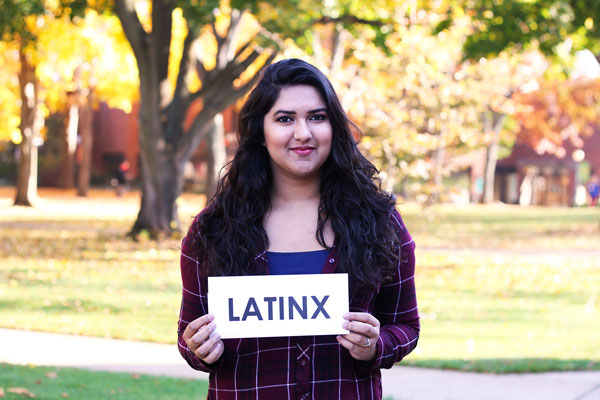For some listeners, one word stood out during the Latino Student Union’s convocation in September: Latinx.
Alexa Valdez, a senior social work major and a Latino Student Union leader, spoke during chapel on Sept. 14 about what exactly it means to be Latinx.“Latinx is trying to break through the barriers that the Spanish language presents,” she said. “It’s full of the gender binary, which makes it difficult for people who don’t identify within the binary to name themselves.”
One key aspect that Valdez stresses is that Latinx invites people to be more inclusive and to be better allies to non-binary people within our community.
Latinx is a term that is used as a gender-neutral alternative to Latino, which is masculine but also is used as an umbrella term to refer to men (Latinos) and women (Latinas). Though there may be many Latinx community members that may not necessarily associate themselves with one specific gender, as of now, there has not been a GC individual who has come forth and directly embraced this term.
Using this term will generate a feeling of inclusion for those who may not associate themselves with a specific gender.
The word is still subject to debate and has not yet been given official status in dictionaries.
Jessica Baldanzi, associate professor of English, endorsed the adoption of Latinx. “Sometimes when people try to come up with gender-neutral solutions they’re awkward, but I think this is a graceful fix,” she said.
In the Spanish language, words generally divide into two camps: the masculine and the feminine [Latina and Latino.]
An article titled “Why People Are Using the Term ‘Latinx’” published in the Huffington Post in July, mentions that the “x” exhibits a sense of rejection of gendering evident in the word Latino. The article noted that due to the rise of many social issues, such as LGBTQ rights, some individuals in the Latinx community are questioning what word to associate themselves with.
Latino or Latina? This is where Latinx starts to play a huge part in defining who these people are. The term is working to move past gender binaries and to become a single general type of a gender system for Latinx across the world.
The rise of the word Latinx has created buzz within Latino Student Union members. A week after the LSU convocation presentation in a LSU club leader meeting, Valdez proposed to the club that they formally commence the process of changing the club name to Latinx Student Union.
The movement towards changing the name of the club to Latinx Student Union is in the works. The club must go through a formal approval process before getting the name changed. Rocio Diaz, coordinator of intercultural community engagement and a Latino Student Union advisor, told members that “Latino Student Union is a club that Student Life has in place since forever ago. I think that it would be appropriate to go through the appropriate channel to request a change in name.”
Valdez, alongside all the LSU leaders, have begun conversations with Launa Rohrer, dean of students, to formally change the name of the club. The members are all hoping that this new title will allow the club to be more inclusive of those who do not identify with a specific gender.
Beth Martin Birky, professor of English and director of Women’s and Gender Studies, said, “I believe that language is a significant representation of our values and beliefs and can influence our experiences. Words create spaces where experiences can be understood in a new way. Words can also be used to negate and erase experiences. That said, it can take a lot of effort to change the language we use, but it is very important to use language that embodies the value of respect and care.”



